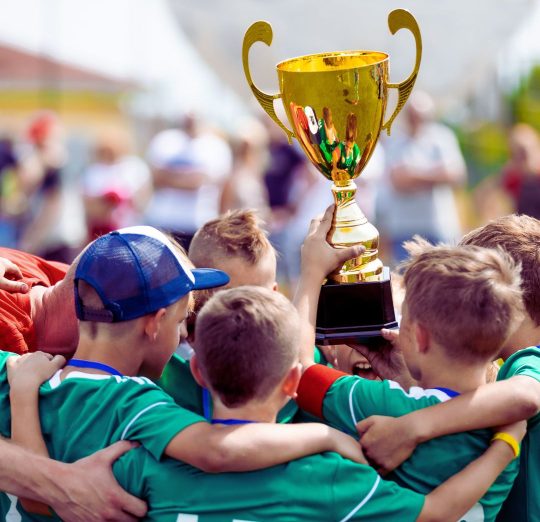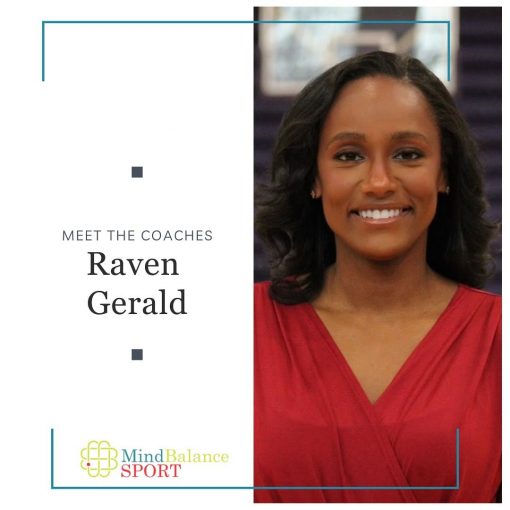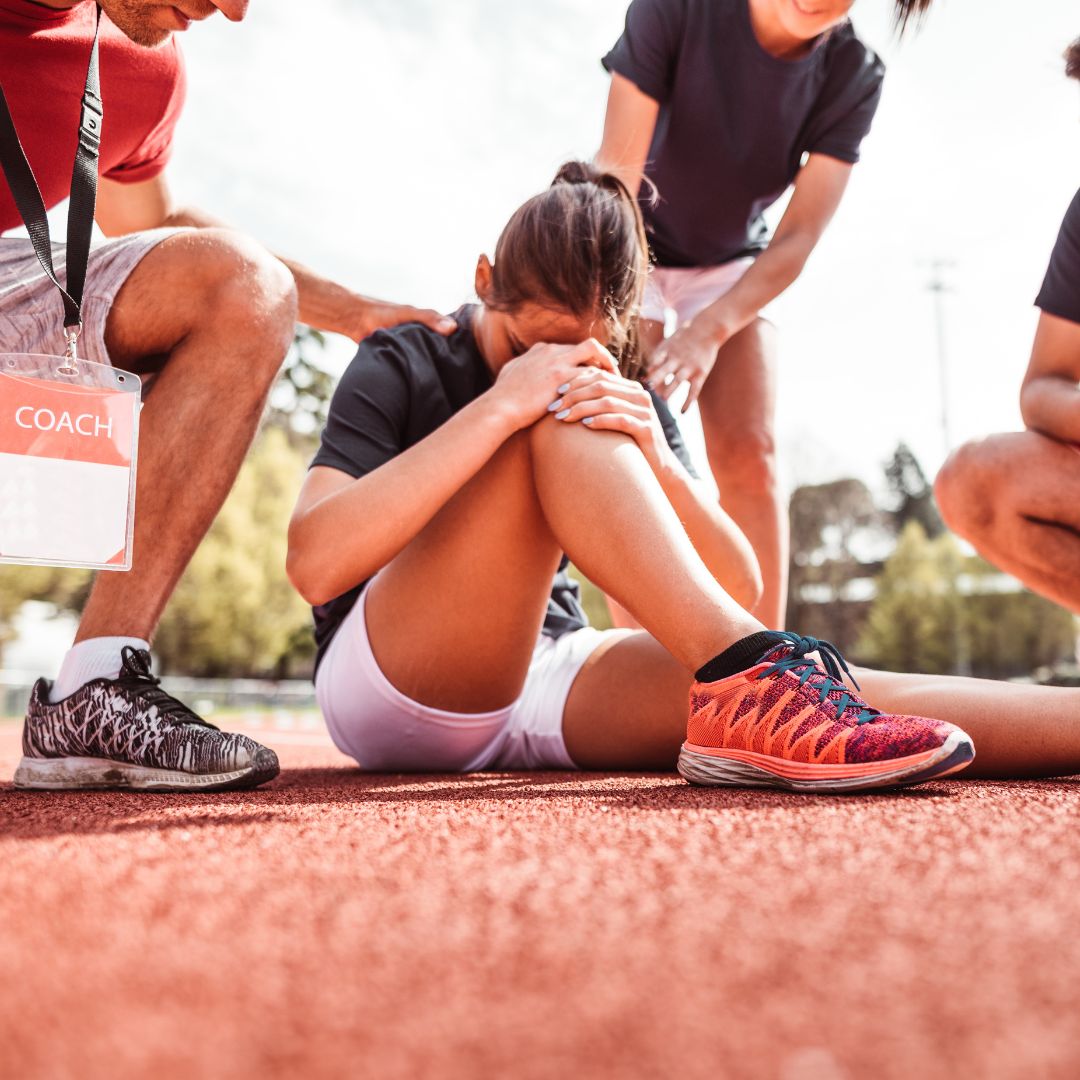Sports Psychologist in Centreville, VA
You want to work on your mental game, but how do you train your brain?
At MindBalanceSPORT, We Train The Other Half Of The Athlete.
You want to work on your mental game, but how do you train your brain?
Mental training does not get much media attention, but at MindBalanceSPORT we know it is a game changer. The mental skills you will learn at MindBalanceSPORT are generalizable in the classroom, in sport and in life!
We know that mental skills can be successfully taught, even at an early age.

Our Services
Meet the Team





testimonials
Athlete Stories: Real Comebacks, Real Results

Emma, a high school basketball player, tore her ACL in the middle of her junior season. After surgery, she struggled with self-doubt and fear every time she stepped back on the court. Through sport psychology training, she learned visualization techniques and confidence-building exercises that helped her regain trust in her knee. When she returned for her senior season, she didn’t just play—she led her team to the playoffs.

Carlos, a soccer player, suffered a stress fracture in his foot and had to miss half of his season. Sitting out was mentally tougher than the pain itself. We worked on mental engagement strategies to keep him sharp—studying game film, setting small rehab goals, and using mental imagery to stay ready. When he was finally cleared, his confidence never wavered.

Jordan, a track athlete, strained her hamstring before a major competition. She feared losing speed and falling behind competitors. Instead of focusing on what she couldn’t do, we redirected her energy toward mental preparation, using self-talk and goal setting to keep her confidence strong. When she returned, she set a new personal record.
EXCELLENTTrustindex verifies that the original source of the review is Google. It was a great help to my 14-year-old competitive volleyball player daughter. Raven was great to understand and connect with her from start to end. We will continue with our sessions as needed.Trustindex verifies that the original source of the review is Google. Great results! I’ve loved working with Paula. Our sessions have greatly improved both the physical and mental aspects of my tennis game. I’m playing better and having more fun! Highly recommend!Trustindex verifies that the original source of the review is Google. Our family had a wonderful experience with Paula Castro. We needed some additional confidence in a particular area/sport and Paula helped get us there. We know who to turn to if we need help again. She’s been a Blessing. Thank you, Paula!Trustindex verifies that the original source of the review is Google. I highly recommend MindBalanceSPORT. Our son works with John Howard. John is very caring, positive, and effective at working with teenagers. John is an adept listener and created an individualized plan tailored to our son’s personality. After just a few sessions with John, we noticed a significant improvement in our son’s motivation and mental approach to sports and life in general. Our son looks forward to meeting with John and tells us that he benefits immensely from their connection.Trustindex verifies that the original source of the review is Google. Paula Castro is an outstanding professional on the field. She has helped my daughter improve her confidence, preparation, and thanks to these session she feels more prepared and motivated. Paula takes the time also to share (what she can) and align with us as parents to be on the same page. Strongly recommended!Trustindex verifies that the original source of the review is Google. MineBalanceSPORT has quickly become the area's expert in sports psychology. Their reputation is well deserved given their incredibly thoughtful, scientifically based approaches to treating performance-related conditions, and I have only heard glowing, positive feedback from those who have engaged in their program. I will also add that Drs. Jones and Chirby presented to us (our group comprises of 15+ doctors and masters level clinicans) about their program and impressed us all with their level of expertise and passion for this field. I give them my highest recommendation.Trustindex verifies that the original source of the review is Google. Dr. Jones was beyond helpful to me throughout our time together. If you are an athlete and you need advice or assistance this is the place to come to. She completely changed my outlook and mindset in a time when I needed her most. I look forward to staying in touch with her and am forever thankful for her expertise.Trustindex verifies that the original source of the review is Google. Paula has been a huge help with my daughter Morgan coming off her injury. It’s been 18 months since she’s played basketball and she’s thriving because I know Paula is guiding her the right direction. As a mother, I’m extremely gratefulTrustindex verifies that the original source of the review is Google. If you are looking for Amazing Psychologists who can help support you in your sports performance, you need to call MindBalanceSPORT! Dr. Chirby and her colleagues are a wealth of knowledge, they have so many helpful techniques for mind balance, and they have so much compassion for the communities that they serve! Highly recommend!!!
Recovery
While Everyone Has A Physical Ceiling, There Is No Mental Ceiling.
How Sports Psychologists in Centreville, VA Help Athletes Overcome the Yips
How Sports Psychologists in Centreville, VA Help Athletes Overcome the Yips
Athletic identity plays a fundamental role in an athlete’s mental performance. It is the self-concept derived from an individual’s identification with their role as an athlete. This identity can directly influence how athletes perceive challenges, including psychological hurdles like the yips—a sudden and unexplained loss of ability to perform skilled movements in sports.
Finding the Right Sports Psychologist Near Me to Understand Athletic Identity
Athletic identity is shaped by:
– Personal Commitment: The emotional and time investment athletes dedicate to their sport.
– Social Recognition: External validation from peers, coaches, and fans.
– Role Exclusivity: The degree to which being an athlete defines one’s overall identity.
When this identity is strong, it provides a sense of purpose and motivation. However, if it becomes overdominant or fragile, it can lead to mental struggles when performance declines or injuries occur.
What Are the Yips?
The yips are a psychological phenomenon characterized by involuntary movements or an inability to perform previously routine tasks in sports such as golf, baseball, or gymnastics. Commonly associated with anxiety and overthinking, the yips can disrupt an athlete’s confidence and focus.
Symptoms often include: – Jerky or uncontrollable motions. – Intrusive negative thoughts during performance. – Performance anxiety exacerbated by external pressure.
The Link Between Athletic Identity and the Yips
An excessively rigid athletic identity may make athletes more vulnerable to the yips. For example: – Failure or underperformance may feel like a personal failure rather than an isolated event. – Athletes with narrow identities may struggle with self-worth when they are unable to meet their own expectations.
Conversely, athletes with a balanced athletic identity often demonstrate resilience against setbacks because they perceive challenges as opportunities for growth rather than threats to their self-concept.
Strategies for Overcoming the Yips via Athletic Identity
- Encourage athletes to develop interests outside of sports (e.g., hobbies or education).
- Reducing overreliance on athletic success helps safeguard self-esteem during tough periods.
- Shift focus from fear-based thoughts (“What if I fail?”) to process-driven goals (“Focus on this breath”).
- Reframe setbacks as learning opportunities instead of catastrophes.
- Techniques like meditation help regulate emotional responses during high-pressure moments.
- Grounding exercises improve focus on present actions rather than past failures or future worries.
- Positive visualization enables athletes to mentally rehearse overcoming barriers effectively.
- This builds belief in their ability to regain control over movements impacted by the yips.
| Strategy | Purpose | Example Exercise |
| Diversify Self-Identity | Broaden sources of self-worth | Explore non-sports activities weekly |
| Cognitive Reframing | Replace negative thoughts with positives | Journaling about small daily victories |
| Mindfulness Practices | Reduce anxiety; enhance presence | Practice guided breathing pre-game |
| Visualization Training | Build confidence through mental rehearsal | Visualize successful performances daily |
Future Implications
By strengthening athletic identity while making it more flexible, athletes can effectively confront psychological barriers such as the yips. Sports psychologists play a pivotal role in helping individuals recognize that their value isn’t solely tied to athletic success but extends beyond competition into broader aspects of life.
How Sports Counselling in Centreville, VA Shapes Athletic Identity
Athletic identity plays a critical role in sports psychology, shaping how athletes perceive themselves and their abilities both on and off the field. Understanding this concept is essential for sports psychologists, as it directly influences performance, motivation, and an athlete’s overall mental well-being.
What Is Athletic Identity?
Athletic identity refers to the degree to which an individual identifies with the athlete role. It is a multidimensional concept encompassing:
– Cognitive Aspects: How athletes think about themselves in relation to their sport. For instance, “I am a runner” or “Being an athlete defines who I am.”
– Emotional Aspects: The feelings tied to being an athlete, such as pride, fulfillment, or even anxiety if performance wanes.
– Behavioral Aspects: The actions that reinforce athletic identity, such as training routines, competition participation, and lifestyle choices.
For many athletes, their sense of self-worth is closely tied to their sporting achievements and abilities.
Why Is Athletic Identity Important in Sports Psychology?
- A strong athletic identity can drive athletes to maintain discipline, focus on goals, and consistently improve their skills. This identity fosters a sense of purpose that sustains long-term commitment to training.
- Over-identification with the athlete role can lead to challenges during periods of injury or retirement from sport. Athletes with limited identities outside of sport may struggle with self-esteem or finding direction when they’re unable to compete.
- Those who have balanced athletic identities tend to cope better with losing streaks or challenges because they view failure as part of the learning process rather than a threat to their self-image.
Strategies for Balancing Athletic Identity
- Encouraging Diverse Roles: Athletes are guided toward exploring hobbies or interests outside of sports (e.g., volunteering, academics). This diversification promotes resilience during periods when athletic performance is disrupted.
- Developing Self-Compassion: Teaching athletes how to separate their performance from their intrinsic value helps reduce negative self-talk following mistakes or losses.
- Mindset Training: Adopting growth-oriented mindsets enables athletes to see setbacks as opportunities for growth rather than reflections of inadequacy.
Table: Positive vs Negative Impacts of Athletic Identity
| Attribute | Positive Impact | Negative Impact |
| Strong Focus | Improves goal-setting abilities | May lead to neglecting personal relationships |
| Motivation | Reinforces discipline | Creates pressure related to constant success |
| Emotional Investment | Enhances enjoyment from accomplishments | Magnifies distress when facing failure |
| Sense of Belonging | Fosters camaraderie in teams | Can feel isolating if injured |
A nuanced understanding of athletic identity allows sports psychologists not only to help performers achieve peak potential but also ensures they remain mentally grounded across all stages of their careers—whether actively competing or transitioning into life beyond athletics.
Exploring Performance Psychology in Centreville, VA: Insights from Polyvagal Theory
Polyvagal Theory, developed by Dr. Stephen Porges, provides a framework for understanding how the autonomic nervous system influences emotional regulation, social engagement, and overall performance. In the context of athletic performance, this theory has profound implications for how sports psychologists help athletes manage stress, anxiety, and focus during training and competition.
What is Polyvagal Theory?
- Activated when individuals feel safe and connected.
- Promotes relaxation, communication, and optimal focus—critical to peak athletic performance.
- Engages in response to perceived danger or high-pressure situations.
- While it can fuel short bursts of energy for a competitive edge, excessive activation leads to anxiety or burnout.
- Triggered during overwhelming stress or perceived helplessness.
- Associated with disengagement or a “freeze” response, which can hinder performance.
These pathways work dynamically in every individual to regulate responses to environmental demands.
How Does It Relate to Sports Psychology?
Sports psychologists utilize insights from Polyvagal Theory to enhance athletes’ self-awareness and mental resilience. By understanding how their physiological states influence emotions and behavior, athletes can effectively manage stressors that occur before, during, and after competition.
- Teaching Athletes Emotional Regulation: Recognizing when they are shifting into fight-or-flight or shutdown responses enables athletes to regain control over their physiological state using targeted techniques.
- Improving Focus Under Pressure: By helping athletes remain in their ventral vagal state (calm but alert), sports psychologists ensure they maintain concentration during high-stakes moments.
- Identifying Recovery Needs: A dysregulated nervous system can lead to physical exhaustion or mental fatigue; therefore, strategies are provided for optimizing rest.
Strategies Grounded in Polyvagal Theory
- Breathwork Exercises: Diaphragmatic breathing activates the ventral vagal system, fostering calmness under pressure.
- Mindfulness Training: Encourages awareness of bodily sensations and emotional triggers while reducing overactivation of fight-or-flight responses.
- Visualization Techniques: Helps prepare the mind and body for success by simulating scenarios in a ventral vagal state.
- Social Support Cultivation: Interactions with teammates or coaches that promote connection further engage the social engagement system.
| Technique | Purpose | Example Practice |
| Diaphragmatic Breathing | Activates calm states for improved focus | 4-7-8 breathing pattern |
| Visualization | Reduces pre-performance stress | Mentally rehearsing optimal execution |
| Mindful Body Scanning | Identifies areas of tension impacting performance | Progressive muscle relaxation exercises |
Benefits of Applying This Framework
Athletes who integrate polyvagal-informed strategies often report: – Decreased pre-game anxiety. – Improved recovery times following intense activity. – Enhanced decision-making skills under competitive pressure. – Greater consistency in maintaining peak performance states.
Polyvagal Theory provides invaluable tools for understanding the mind-body connection that drives athletic achievement. When applied effectively by sports psychologists, it empowers athletes to perform confidently even under challenging circumstances while prioritizing long-term well-being.
How Sport Performance Training in Centreville, VA Helps Athletes Build Resilient Mental Frameworks
Developing mental resilience is a key factor in achieving consistent performance in sports. Sports psychologists play a critical role in helping athletes build strong, adaptive mental frameworks that allow them to face challenges, setbacks, and high-pressure situations with greater confidence and focus. This article explores the strategies sports psychologists use to craft these resilient mindsets.
The Foundations of Mental Resilience in Sports
- Stay focused during high-stakes competitions
- Recover from failure or poor performances
- Manage anxiety and self-doubt effectively
- Improve consistency in training and competition
Sports psychologists use evidence-based methods to help athletes strengthen these traits.
Key Strategies for Building Resilient Mental Frameworks
- Cognitive Behavioral Techniques (CBT)
CBT helps athletes identify negative thought patterns that may hinder their performance and replace them with constructive ones. For example: - Recognizing catastrophic thinking (“I’ll never succeed”) and reframing it into actionable goals.
- Practicing positive self-talk during challenging moments.
- Mindfulness-Based Training
Mindfulness teaches athletes how to stay present in the moment without judgment, which enhances focus and reduces anxiety. Techniques include: - Breathing exercises
- Meditation practices
- Visualization of successful performances
- Goal Setting
Creating clear, achievable goals allows athletes to maintain motivation and track progress over time: - Long-term goals: Winning championships or reaching professional levels.
- Short-term goals: Improving a specific skill or achieving personal bests during practice.
- Stress Management Techniques
Learning how to cope with stress is vital for sustained success: - Progressive muscle relaxation (PMR) for physical tension relief.
- Journaling emotional responses after games or practices for reflective growth.
Case Study: Applying Resilient Frameworks
| Step | Technique Applied | Desired Outcome |
| Initial Assessment | Identify triggers | Understand sources of anxiety |
| CBT Intervention | Reframe negative thoughts | Build confidence through positivity |
| Mindfulness Training | Guided breathing exercises | Promote calmness under pressure |
| Visualization Practice | Imagine tournament success | Enhance preparation mentally |
By addressing specific challenges holistically, the athlete can develop mental tools that ensure better outcomes over time.
Benefits of Working With Sports Psychologists
- Improved clarity when setting priorities
- Enhanced recovery from setbacks
- Greater emotional regulation during intense moments
- Stronger overall performance consistency
Whether working with elite competitors or beginners, sports psychologists empower individuals to build psychological strength essential for long-term success on and off the field.
Building Mental Toughness in Sports with a Sports Mental Coach in Centreville, VA
Athletic identity plays a pivotal role in an athlete’s mindset, influencing how they perceive themselves, respond to challenges, and build resilience in the face of adversity. Understanding and nurturing this identity can have profound effects on an athlete’s mental toughness, directly impacting their performance and overall well-being.
What is Athletic Identity?
Athletic identity refers to the degree to which an individual identifies with their role as an athlete. It encompasses their self-image, behaviors, values, and goals tied to sports participation. A strong athletic identity can motivate athletes to work harder and stay committed to their craft, but it also requires balance to avoid potential downsides such as over-identification or emotional volatility.
- Self-Perception: Viewing oneself as a capable and skilled athlete.
- Commitment: Dedication toward training, practice, and competition.
- Social Identity: Recognition by peers as a member of the sports community.
- Emotional Investment: Passion for sport-related success.
Why Athletic Identity Matters for Mental Toughness
Mental toughness is often defined as the ability to navigate stressors, maintain focus under pressure, and persist through challenges. Athletic identity directly contributes to mental toughness by shaping how athletes view setbacks and successes.
- Clarity of Purpose
Athletes with a strong sense of who they are within their sport often approach challenges with greater determination. They see obstacles as opportunities for growth rather than threats to their self-worth. - Emotional Regulation
A well-balanced athletic identity supports emotional stability during high-stakes scenarios like competitions or injury recovery. - Intrinsic Motivation
When athletes derive purpose from their personal connection with the sport rather than external rewards alone (e.g., titles or accolades), they are more likely to persevere through difficulties. - Confidence Development
Believing in one’s ability rooted in athletic identity fosters confidence even when faced with adversities like losing streaks or performance slumps.
| Aspect | Impact on Mental Toughness |
| Self-Perception | Enhances confidence under pressure |
| Commitment | Drives persistence despite setbacks |
| Social Recognition | Builds support networks that reinforce resilience |
| Emotional Investment | Encourages adaptive coping strategies during adversity |
Strategies for Strengthening Athletic Identity
- Reflective Practices: Encouraging athletes to reflect on what being an athlete means to them and why it matters in both personal and professional contexts.
- Goal Setting: Fostering long-term goals beyond immediate results helps broaden perspectives while maintaining focus on competitive aspirations.
- Diversifying Interests: Encouraging involvement in non-sport activities reduces over-reliance on sports achievements for self-worth.
- Mindfulness Training: Helps athletes remain grounded while managing emotional responses tied closely to performance outcomes.
By fostering a healthy sense of identity both inside and outside the world of sports, athletes are better equipped not just for competition but also for life transitions such as injuries or retirement from professional play.
Challenges Associated with Overidentifying
- Fear of Failure: Athletes may tie self-worth too closely with success, leading to heightened anxiety during failure scenarios.
- Post-Career Struggles: Transitioning away from sports becomes emotionally difficult if one’s entire sense of self revolves around being an athlete.
- Rigid Thinking: Over-identifying can limit versatility when adapting approaches during new challenges.
Maintaining balance ensures that athletic identity remains a tool for growth rather than becoming limiting or detrimental over time.
Fostering this balance provides the foundation not just for long-lasting careers but also resilient mindsets that extend far beyond sporting arenas—helping athletes thrive both professionally and personally throughout all stages of life development.
Exploring Sports Psychiatry in Centreville, VA: Breaking Mental Barriers
Mental barriers can often hinder athletes from reaching their full potential, both in training and competition. These barriers may stem from performance anxiety, fear of failure, low confidence, or even past traumatic experiences. Sports psychologists play a critical role in identifying and addressing these challenges to unlock an athlete’s peak performance.
Common Mental Barriers in Sports
- Performance Anxiety: Overthinking or excessive fear of making mistakes during critical moments.
- Fear of Failure: An overwhelming concern about letting down teammates, coaches, or oneself due to poor performance.
- Imposter Syndrome: Feelings of inadequacy despite evidence of success and skill.
- Lack of Focus: Difficulty maintaining concentration during games or practices due to external pressures or distractions.
- Self-Doubt: Negative self-talk that erodes confidence over time.
How Sports Psychologists Help Athletes Break Through
- Identifying negative thought patterns that contribute to anxiety and self-doubt.
- Replacing these thoughts with constructive, empowering beliefs.
- Guiding athletes to mentally rehearse successful performances.
- Helping create vivid scenarios where they overcome specific challenges.
- Teaching techniques like deep breathing and meditation to stay present during high-pressure situations.
- Reducing stress by focusing on controllable aspects rather than outcomes.
- Collaborating with athletes to establish short-term and long-term performance goals.
- Creating action plans that build confidence through incremental achievements.
- Introducing tools such as journaling or self-reflection exercises.
- Encouraging healthy outlets for frustration or fear outside the sport environment.
Case Study Example
| Athlete Scenario | Psychological Barrier | Key Intervention | Outcome |
| Elite sprinter struggling with false starts | Performance anxiety | Visualization training + breathwork | Improved race starts; regained focus |
| Team captain afraid of criticism | Fear of failure | Cognitive reframing + goal setting | Boosted leadership confidence |
| Tennis player unable to finish matches | Self-doubt | Positive self-talk exercises | Consistently strong match finishes |
Why Addressing Mental Barriers Matters
Mental preparedness is just as vital as physical training for athletic success. When mental roadblocks go unaddressed, they can lead to plateaus in performance—or worse, burnout and withdrawal from sports altogether. Working with a sports psychologist ensures athletes not only break through their mental barriers but also develop resilience for future challenges.
By fostering a partnership between psychology and athletics, sports psychologists empower individuals to excel under pressure while maintaining emotional well-being over the long term.








